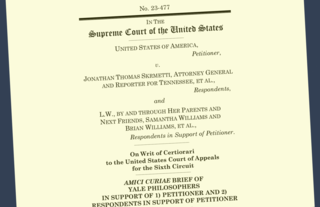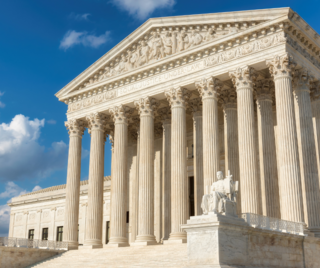“I think it speaks to the weakness of Tennessee’s argument in the case, that you would have so many prominent and very thoughtful, brilliant scholars agree on something like this,” Amanda Shanor ’03 LAW ’09 GRD ’22, a professor at the Wharton School who worked on both briefs, told the News.
The Yale philosophers’ brief points out that Tennessee’s arguments in defense of SB1 are circular and that they rely on stereotypical conceptions of gender and sex.
The office of the Tennessee attorney general did not respond to the News’ request for comment.
The amici in the philosophers’ brief are 21 professors and professors emeriti in the Department of Philosophy. According to professor Robin Dembroff, who spearheaded the brief along with professor Issa Kohler-Hausmann, the process of filing the brief “was an enormous collaboration” with lawyers at the Complex Appellate Litigation Group in California as well as academics at other institutions, with members of the Yale Department of Philosophy providing feedback along the way.
Kohler-Hausmann and Shanor both emphasized the exceptional nature of the brief, pointing to how it drew widespread support from professors of philosophy who customarily disagree with each other on many other topics.
“Lawyers and philosophers quibble with each others’ interpretation of legal texts or how to formulate an argument almost as a matter of professional pride,” Kohler-Hausmann wrote to the News. “But in the face of a wrong being done to vulnerable people — gender nonconforming minors in states where they and their families are a political minority — those involved in this brief choose to put moral action in the world above the professional penchant for disagreeing with each other.”
According to Dembroff, philosophers can provide an “incredibly valuable” perspective for the Court and are “uniquely positioned” to expose faulty arguments.
For YLS visiting professor Steven Calabresi ’80 LAW ’83, who contributed to the brief led by Eskridge, the case is also about shielding families from unnecessary — and potentially unconstitutional — intervention by the government.
“My view about this is that constitutional law gives parents a lot of liberty over the upbringing of their children,” Calabresi told the News. “For me, the case is very much about parenting, and it’s about parents being able to make decisions for their children, not about Big Brother — the government — making decisions about how parents can rear their children.”
Calabresi also pointed to Supreme Court precedents such as Wisconsin v. Yoder and Troxel v. Granville, which both reaffirmed the Court’s deference to parents’ decisions about rearing their children.
According to Calabresi, both he and Eskridge agreed that a legal historical approach to the brief would be most compelling for the Supreme Court’s conservative majority.
“We focused on a legal, historical standpoint because I think that’s what the six Republican-appointed Supreme Court justices are most interested in,” Calabresi said. “They’re also, as it happens to be the case, the arguments that I find the most persuasive.”
Beyond the Supreme Court, the Yale philosophers are working to promulgate their legal work on a broader stage. According to professor L.A. Paul, an amicus on the philosophers’ brief, the brief has been “widely disseminated amongst philosophers and in online ventures where philosophical conversations take place.”
The Supreme Court’s 2024–25 term will begin on Oct. 7, 2024.

